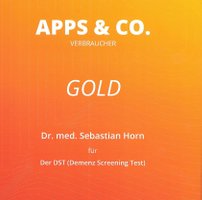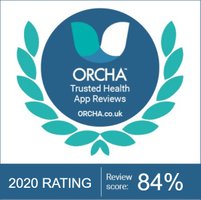Changing Dementia.
To date, there is no effective treatment for advanced stages of dementia.
Therefore, effective early detection is crucial to begin treatment before the brain damage becomes irreversible.
DEMENTIA
... affects all of us. 1)
People with dementia, carers, family, and society.
An estimated 850,000 people in the UK have dementia. Above 85, the condition affects almost 1 in 2 people. This means, if nothing changes, latest at the age of 85 you very likely will either have dementia, or you will take care of somebody with dementia.
... can be detected early. 3)
With special tests like the DST, dementia risks can be detected 18 years prior to the first symptoms 1), during a dementia phase for which good treatment options exist.
The Dementia Screening Test (DST) is the only such test which has been classified according to regulations as a Medical Device.
... begins in the mid-40s. 7)
Dementia should no longer be seen as a disease of the elderly, but one of the middle-aged, which is clinically silent for a long time.
... can often be prevented. 7) 8)
Around 35% of dementia risk factors are modifiable. And so called "Superagers" have clear neurodegenerative changes in their brain, but don't show dementia symptoms. Effective preventive measures include treating diseases which may cause dementia (e.g. hearing loss, diabetes), and lifestyle changes.
... is diagnosed too late in most cases. 2)
Early stages are also called MCI - Mild Cognitive Impairment. The goal is to identify patients in this early stage, to prevent progression to mild or even severe Dementia, when the brain damage is irreversible. 4) 5)
... can be treated best at early stages. 1)
There are still no effective medicines for advanced stages of dementia - however, the right active substances may actually be investigated, but at the wrong time, i.e. too late in the disease process. Therefore, scientists now focus on early disease stages.
The Dementia Screening Test (DST) is the only Dementia Test
which is a Medical Device as per the regulations.
Reliable.
More than 96 % sensitivity - probably the highest value for such tests worldwide.
(DST >96%, MMSE 81%) 6)
Reliably detects early risks -
proven in clinical studies.
CE-marked Medical Device.
Includes progress monitoring and prevention recommendations.
Easy.
Designed for home use.
No support person needed.
No prior knowledge needed.
Works on every current tablet or smartphone.
Secure.
100 % anonymous - guaranteed!
No registration required.
No personal data collected.
No internet connection needed.
No advertisements.
Awards & Recognitions
Test now and change Dementia.
FAQ - Frequently Asked Questions
Who should perform the DST - Dementia Screening Test?
All persons latest at the age of 50 or older.
Who should not perform the DST - Dementia Screening Test?
The DST should not be performed by
- persons who are not willing and/or able to change their living habbits, even when faced with a serious medical condition.
- persons who would over-react to a not completely impossible false positive result, if it has to be assumed that the over-reaction would cause more harm than an early intervention would cause benefit.
Which advantages does the DST - Dementia Screening Test have? Why should anyone take the test?
The DST benefits
1. the individual patient through early detection and intervention in a disease state when this is still possible.
2. the General Practitioners and Neurologists by relieving the daily routine in the practice, by targeting (only) those patients who are likely to benefit from further diagnostics.
3. society as a whole through early interventions, most of which are low cost / free of charge, and which delay or prevent high follow-up costs for many patients, e.g. by delaying / preventing a retirement home stay.
Contact
What can we do better?
What do you like?
Has the test helped you or a loved one?
We look forward to your feedback!
1) World Health Organization, https://www.who.int/features/factfiles/dementia/en/
2) Bradford et al (01 Oct 2009). "Missed and Delayed Diagnosis of Dementia in Primary Care: Prevalence and Contributing Factors". Alzheimer Disease Assoc Disord. 23(4):306-314. doi: 10.1097/WAD.0b013e3181a6bebc
3) Evans et al (08 Sep 2015). "Cognitive impairment 18 years before clinical diagnosis of Alzheimer disease dementia". Neurology. 85 (10): 898–904. doi:10.1212/WNL.0000000000001774.
4) Thyrian et al (April 2016). "Systematic, early identification of dementia and dementia care management are highly appreciated by general physicians in primary care – results within a cluster-randomized-controlled trial (DelpHi)". Journal of Multidisciplinary Healthcare: 183. doi:10.2147/JMDH.S96055.
5) Erde et al (Apr 1988). "On truth telling and the diagnosis of Alzheimer's disease". J Fam Pract. 26(4):401-6. PMID: 3356973
6) Tsoi et al. (01 Sep 2015). "Cognitive Tests to Detect Dementia: A Systematic Review and Meta-analysis". JAMA Internal Medicine. 175 (9): 1450. doi:10.1001/jamainternmed.2015.2152.
7) The Lancet, Commission on Dementia Prevention, Intervention, and Care, Vol 390: 2673 - 2734, 26 Dec 2017; hier und vollständiger Artikel hier: doi.org/10.1016/S0140-6736(17)31363-6
8) World Health Organization: Risk reduction of cognitive decline and dementia. WHO Guideline













